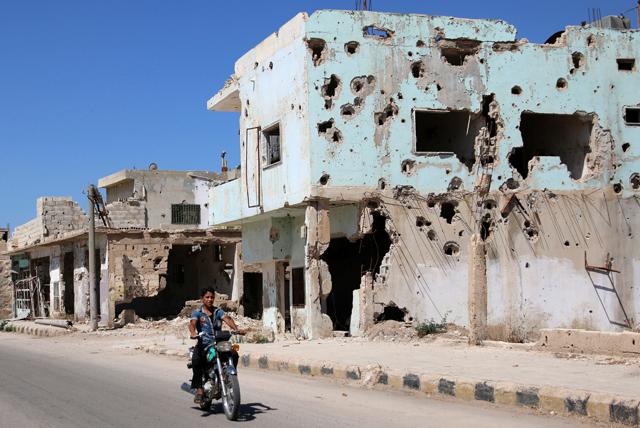You are here
Scores poisoned in Aleppo gas attack, Syria and Russia blame rebels
By Reuters - Nov 26,2018 - Last updated at Nov 26,2018

A Syrian woman receives treatment at a hospital in the regime controlled Aleppo on Saturday (AFP photo)
BEIRUT — More than 100 people were wounded in Syria's Aleppo late on Saturday in a suspected toxic gas attack which the government and its ally, Russia, blamed on insurgents.
A health official in Aleppo said victims suffered breathing difficulties, eye inflammation and other symptoms suggesting the use of chlorine gas. Rebel officials denied the allegations and said their forces did not possess chemical weapons.
Russia's defence ministry said on Sunday its warplanes bombed militants in the insurgent stronghold of Idlib who it accused of firing poison gas at Aleppo.
Major General Igor Konashenkov said Moscow sent advance warning to Ankara, which backs some rebel factions and helped broker a ceasefire in Idlib.
A monitoring group said air strikes hit rebel territory in northwest Syria on Sunday for the first time since Russia and Turkey agreed a buffer zone there in September.
In Aleppo city, which the government controls, the shells had spread a strong stench and caused breathing problems, the Syrian Observatory for Human Rights also said.
State news agency SANA said on Sunday 107 people were injured, including children, after militants hit three districts with projectiles containing gases that caused choking.
It marks the highest such casualty toll in Aleppo since government forces and their allies clawed back the city from rebels nearly two years ago.
"We cannot know the kinds of gases but we suspected chlorine and treated patients on this basis because of the symptoms," Zaher Batal, the head of the Aleppo Doctors Syndicate, told Reuters.
Hospitals had discharged many people overnight. Batal said this was the first gas attack against civilians in the city since the conflict erupted more than seven years ago.
Stretchers and oxygen masks
Turkish Defence Minister Hulusi Akar and his Russian counterpart agreed on Sunday that “recent provocations” were aimed at harming the agreement on Idlib, the ministry said.
“There was an exchange of views to the effect that ... they could continue and that one needed to be ready for them,” the ministry said in a statement.
Nobody has claimed the Aleppo attack so far.
“The explosive [shells] contain toxic gases that led to choking among civilians,” the city’s police chief Issam Al Shilli told state media.
Pictures and footage on SANA showed medical workers carrying patients on stretchers and helping them with oxygen masks.
Syria’s foreign ministry urged the UN Security Council to condemn and punish the attack.
Abdel Salam Abdel Razak, an official from the Noureddine Al Zinki insurgent faction, said rebels did not own chemical weapons or have the capacity to produce them.
Abu Omar, a Failaq Al Sham spokesman, accused Damascus of trying to create “a malicious charade” as a pretext to attack rebel towns.
The UK-based Observatory said government shelling earlier on Saturday had killed two women and seven children in a village in Idlib.
The Russian-Turkish deal in September for a demilitarised zone staved off an army offensive against the Idlib region, including nearby parts of Aleppo and Hama provinces.
The dominant force among an array of factions holding sway in Idlib is Tahrir Al Sham, an Islamist alliance led by fighters formerly linked to Al Qaeda.
A past UN-OPCW inquiry found the Syrian government used the nerve agent sarin in 2017 and also used chlorine several times. It also blamed Daesh for using mustard gas.
Damascus has repeatedly denied using chemical weapons in the war.
No rebel group has been confirmed to have used chemical weapons in the war by the by the Organisation for the Prohibition of Chemical Weapons.
Related Articles
BEIRUT — The Syrian government has denied a UN report accusing it of a sarin attack in April that killed scores of people, state media said
DAMASCUS — Syrian state media said on Sunday that rebels had fired shells containing toxic gas into government-held parts of Aleppo, leaving
BEIRUT — The United Nations called on Tuesday for an immediate humanitarian ceasefire in Syria of at least a month, as heavy air strikes wer














